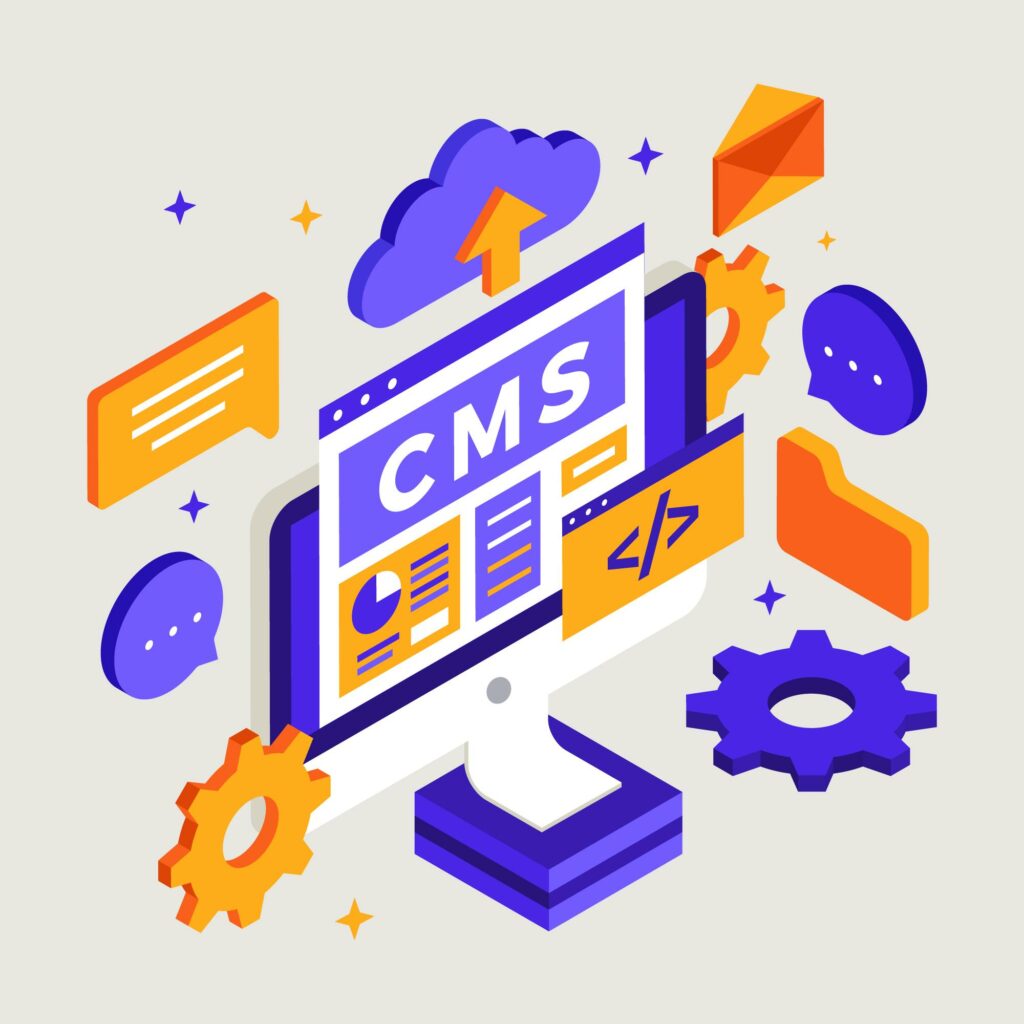Businesses choose Drupal CMS for web development, offering personalized experiences, improved SEO, and no licensing costs. Its adaptability on the LAMP stack, modular structure, and compatibility with various systems make it versatile. With a global community and mobile responsiveness, Drupal is cost-effective. However, businesses should consult to ensure it aligns with their specific needs.
What is Drupal CMS used For?
Drupal is a unique CMS system helping organizations to have strong onlie presence. Whether it’s showcasing art collections, boosting security for governments, or powering e-commerce, Drupal as an ecellent tool. With a web development expert, your site can be tailored to unique needs. Drupal’s flexibility and scalability make it a powerful tool for organizations aiming to make a big impact in the digital world.
What is Drupal Web Development?
Drupal Web Development is the main tool behind successful websites across industries. It involves using Drupal CMS to construct, customize, enhance, and maintain websites.

The process begins with Discovery and Strategy, understanding organizational goals, key requirements, and user interactions. Design follows, focusing on creating engaging, user-friendly designs, leading to Development, Quality Assurance, and finally Launch.
Drupal Web Development transforms websites into dynamic assets, engaging audiences, ensuring security, and providing the flexibility to thrive in the evolving digital landscape.
What is Drupal CMS Application Development?
Beyond website development, Drupal serves as a system for building innovative web applications. Drupal application development uses the platform’s strength to craft feature-rich, interactive apps for personalized experience.

With its modular structure, Drupal seamlessly integrates diverse modules into app development, offering custom features aligned with specific business and organizational requirements. This approach empowers organizations to implement various functionalities, including interactive user interfaces, data management tools, e-commerce solutions, custom job boards, and robust learning management systems (LMS).
1. Scalability
Drupal’s high scalability makes it an optimal CMS for constructing enterprise-grade websites, particularly favored by businesses with a large user base. Its modular architecture enables seamless addition of features and functionalities to meet evolving website needs.
2. Customization
Drupal stands out for providing users with superior customization abilities. Being open-source, it allows free usage and modification, facilitating the creation of tailored websites to meet specific user needs.
The availability of various modules and themes further enables businesses and organizations to customize the look and feel of their websites, making Drupal a popular choice for those requiring a powerful and flexible CMS.
3. Robust User Management
Drupal simplifies content creation and management through its intuitive interface, making it easy to create and edit content. Moreover, it offers robust user management capabilities, empowering users to define roles and permissions. This flexibility allows control over access to content and specific actions.
4. Enhanced SERP Rankings
Achieving a high position on search engine results pages (SERPs) is a common goal for businesses. However, not all content management systems (CMSs) can make it happen. Drupal CMS holds a an advantage with its built-in SEO capabilities, making it easier to boost a website’s search engine rankings.
What types of applications are feasible with Drupal?
With its flexibility, businesses can use Drupal Web Development Services to construct a diverse range of applications. Drupal acts as an excellent tool for developing custom applications that align with various organizational objectives and gain strategic growth in sectors like:
- Learning Management Systems for online education
- Online/Digital Museum Collections for cultural institutions
- Complex Job Boards for streamlined hiring processes
- Progressive Web Apps for captivating visitor experiences
What programming language does Drupal CMS use?
Drupal is built using the PHP programming language, known for its flexibility and easy integration with web servers, making it an excellent choice for web development.
PHP handles the backend of Drupal sites, taking care of tasks such as data processing, content management, and user interactions. It can be customized to meet organizational and growth goals, seamlessly integrating with databases like MySQL for reliable performance and security.
Understanding that Drupal relies heavily on PHP ensures that growth-focused organizations can tap into a vibrant ecosystem of developers and resources to enhance their digital presence consistently.
In traditional Drupal implementations, you’ll find integrated CSS and Javascript, while modern headless or composable architectures often use frameworks such as React or Angular, developed in Javascript or TypeScript.
Is Drupal a CMS or a Framework?
Drupal is both a CMS and a framework It works as a content management system (CMS) for tasks like content creation and management, but it goes further. Developers can add extra features using custom modules, turning it into a strong framework.

This double role is a big plus for Drupal Web Development Services. It lets businesses fine-tune their digital solutions to fit their needs, whether they’re creating content-heavy websites or complex web applications.
Why Choose Drupal Over Other CMSs?
When selecting a CMS for your business, you encounter numerous options, leading to confusion in making the right choice. Among these options, Drupal emerges as the perfect selection, providing several advantages for businesses in web solution development.
Let’s explore the reasons to opt for this CMS based on the benefits it delivers.
1. Flexibility and Scalability:
Opting for Drupal is primarily driven by its exceptional flexibility and high scalability, making it a favored CMS for businesses. Its modular architecture allows for extensive flexibility and scalability, enabling the creation and seamless integration of custom modules into websites.
The content management system is adept at handling large volumes of data, rendering it an excellent choice for high-traffic websites. Leveraging PHP and relying on the MySQL database for content storage and configuration enhances its capabilities.
2. Security:
In the current landscape where online fraud and vulnerabilities are on the rise, addressing security concerns is crucial for businesses. Drupal excels in providing out-of-the-box methods to enhance the security of web solutions.
Through various core and contributed modules that promote two-factor authentication, password security, and encryption, Drupal takes security a step further. Opting for Drupal CMS development services allows businesses to further fortify their website’s security through frequent updates and adherence to secure coding practices.
3. Easier Integration:
Drupal facilitates seamless integration with third-party apps, enhancing a website’s functionality. This increased flexibility makes it simpler for businesses to dynamically extend their services.
5. Customization Flexibility:
The level of customization offered by Drupal is extensive, allowing users to personalize nearly every aspect of their site without the need for intricate custom code. From pages and blogs to polls, forums, designs, layouts, aesthetics, fonts, stock images, 3rd party themes, colors, and more, Drupal’s flexibility empowers users to tailor their website to specific preferences.
6. SEO Friendliness:
Drupal simplifies SEO implementation with powerful SEO modules, modern web publishing tools, and clean code. These elements form the foundation of Drupal’s capability to offer developers a wide array of 3rd party modules that elevate search engine optimization initiatives.
The focus on content, coupled with efficient URL control, positions Drupal as an ideal CMS for seamlessly promoting content through SEO, consuming less time compared to other CMSs.
How Drupal Benefits Businesses:
Drupal helps businesses in the following ways:
1. Cost-Efficiency:
Drupal is an open-source content management system, meaning it’s free to use. This eliminates licensing fees and extra costs. Businesses only need to budget for Drupal development services, making it a wallet-friendly solution. This way, funds can be redirected to crucial areas like design, development, or ongoing support.
2. Versatility:
Businesses have diverse needs, ranging from eCommerce to service-oriented websites. Drupal’s versatility shines in adapting to these changing industry requirements. It proves to be the right CMS for various industries, accommodating different features and functionalities as needed.
3. Mobile Responsiveness:
In today’s digital age, users prefer accessing information on the go using mobile phones. With an estimated 7.49 billion mobile phone users by 2025, focusing on responsive and mobile-first development is crucial.
Drupal meets this need with its fluid grid layout, adjusting dynamically to different screens. This ensures responsive development, allowing websites to display seamlessly on various devices without sacrificing functionality or user-friendliness.
Who Uses Drupal? Is Drupal Still Popular?
Drupal’s popularity remains strong, seen on over 9 percent of the world’s top 10,000 websites by traffic. Despite some thinking it’s only for big businesses, organizations of all sizes choose Drupal. Its lasting appeal comes from powerful features, incredible flexibility, and adaptability for complex websites and applications.

The Drupal community plays a crucial role in its success as an Open Source CMS. This dedicated community consistently adds new features and improves code, ensuring ongoing enhancements and making Drupal a reliable long-term choice.
Now, let’s look at the various well-known companies and organizations that benefit from Drupal’s capabilities.
Who Can Benefit from Drupal?
Drupal is versatile and beneficial for a variety of businesses and organizations, whether you’re a digital business owner, part of a non-profit, a higher education institution, or a government agency.
B2B and B2C Businesses:
Both B2B and B2C businesses can make the most of Drupal’s flexibility and scalability. With a wide range of modules and themes, Drupal lets businesses create custom websites to meet their unique needs.
Whether showcasing products, providing online booking services, or integrating e-commerce features, Drupal has it covered. Plus, it ensures robust security for business and customer data.
Non-Profit Organizations (including Cultural Arts Institutions):
Non-profits, like cultural arts institutions and museums, find great value in Drupal. It comes with built-in tools for fundraising and volunteer management, making engagement and cause awareness straightforward. Drupal’s multilingual capabilities also help non-profits reach a global audience for greater impact.
Higher Education Institutions:
Drupal empowers higher education institutions with robust content management, making it easy to deliver educational content to students, faculty, and staff. Its multilingual capabilities cater to diverse student populations, offering a global learning experience.
The scalability of Drupal suits universities with a variety of courses and programs. Institutions can customize their websites for unique online experiences, backed by reliable support from the Drupal community.
Government Agencies:
Government agencies can use Drupal’s powerful content management to share information and services with constituents. Drupal’s accessibility features ensure inclusivity for all citizens. Its modular architecture allows seamless integration with other systems and databases, streamlining operations for improved efficiency.
Why Choose Drupal Over WordPress?
Drupal and WordPress are both popular content management systems, each with its own strengths. Here’s why Drupal stands out:
1. Customization:
WordPress allows changes in themes or code modifications for customization. However, Drupal takes it a step further, offering more flexibility to create tailored website structures, making it great for complex projects. If you have a detailed Drupal-based project, consider hiring a Drupal web developer.
2. Security:
Security is crucial, and Drupal takes it seriously with regular updates and a dedicated team. While WordPress also provides security, it often needs additional plugins for added protection.
3. Scalability:
As your business grows, Drupal’s architecture and flexibility make it a better fit for large, dynamic websites, handling heavy traffic and complex content structures.
WordPress is better suited for small to medium-scale businesses but can be used by larger enterprises with proper support from a WordPress development company.
In comparison to other CMS options like WordPress and Joomla, Drupal stands out with its high customization, strong security, and robust user management capabilities. Its powerful features, device-independent design, and SEO-friendly attributes contribute to improved search engine rankings, a key factor in online visibility.
[Want to learn more about Drupal CMS and how it can Benefit your Business? Click here to reach us.]
Conclusion
Drupal CMS stands out for its versatility. It’s not just a CMS; it’s a reliable ally offering customization, top-notch security, and scalability. With strong community support and regular updates, Drupal simplifies web development, making it a top choice for businesses.
It’s more than a tool; it’s your partner for navigating the ever-changing online landscape, ensuring endless possibilities and a seamless web development journey. With the support of an outsourced team such as Bobcares you can learn more about Drupal and effectively implement the tool in your business.
PREVENT YOUR SERVER FROM CRASHING!
Never again lose customers to poor server speed! Let us help you.
Drupal CMSOur server experts will monitor & maintain your server 24/7 so that it remains lightning fast and secure.







0 Comments